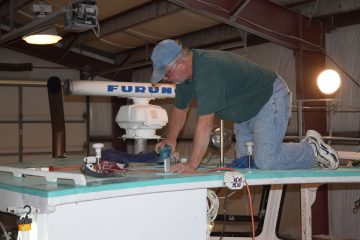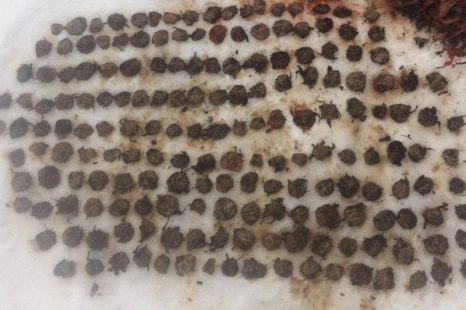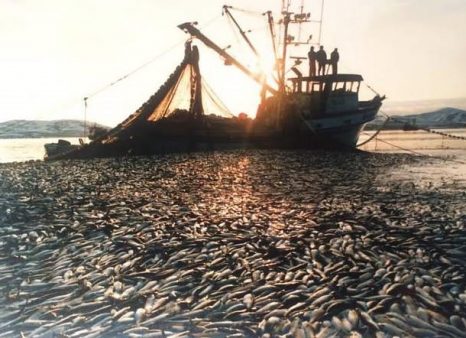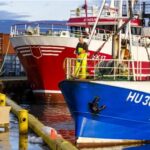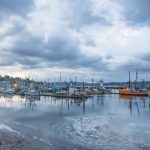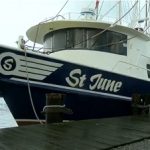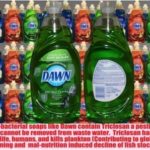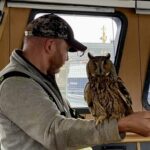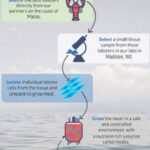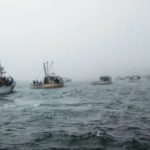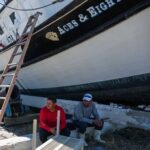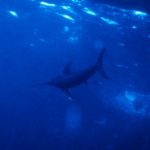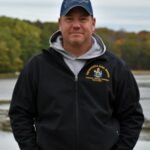Monthly Archives: March 2017
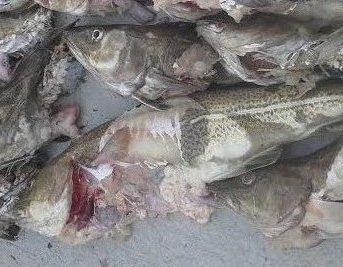
DFO scientist says no ‘strong indications’ seals are gobbling up all the cod
It’s a widespread belief in fishery circles, but one DFO scientist says that for now, you just can’t assume that it’s true. John Brattey says the scientific evidence does not support the notion that seal populations are hindering the rebuilding of cod stocks by gobbling up all the fish. Brattey admits it’s not easy to get good data on the diets of harp seals, but says what studies have been performed do not support the notion. Some evidence can be found just by looking at the recovery rates in the last decade, he said. continue reading the rest, click here 08:43
FOR IMMEDIATE RELEASE: NEW JERSEY FILES FORMAL APPEAL OF SUMMER FLOUNDER QUOTA REDUCTIONS
 New Jersey representatives to the Atlantic States Marine Fisheries Commission have filed an appeal requesting the commission reconsider its vote significantly reducing the state’s recreational-fishing quota for summer flounder this year, Department of Environmental Protection Commissioner Bob Martin announced today (March 28, 2017). “We are appealing the ASFMC decision because of the numerous process, data, policy and regulatory issues that will significantly impact New Jersey’s fishing industry,” Commissioner Martin said. “The ASFMC decision will actually result in anglers in New Jersey having to throw more dead fish back into the water than they can keep to eat, and the fish they can keep overwhelmingly will be reproductive females. This is not sound fishery management.” Read the press release here 08:02
New Jersey representatives to the Atlantic States Marine Fisheries Commission have filed an appeal requesting the commission reconsider its vote significantly reducing the state’s recreational-fishing quota for summer flounder this year, Department of Environmental Protection Commissioner Bob Martin announced today (March 28, 2017). “We are appealing the ASFMC decision because of the numerous process, data, policy and regulatory issues that will significantly impact New Jersey’s fishing industry,” Commissioner Martin said. “The ASFMC decision will actually result in anglers in New Jersey having to throw more dead fish back into the water than they can keep to eat, and the fish they can keep overwhelmingly will be reproductive females. This is not sound fishery management.” Read the press release here 08:02
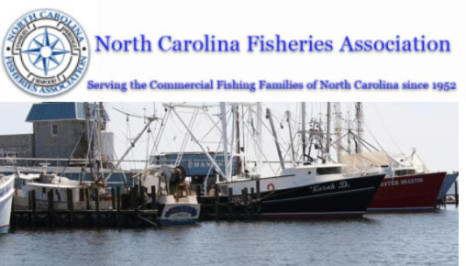
North Carolina Fisheries Association Weekly Update for March 27, 2017
Click here to read the Weekly Update, to read all the updates, Click here 07:21
On The Hot Seat! Dare GOP confronts N.C. GOP chair on shrimp vote
 In the wake of the N.C. Fisheries Commission’s approval of a petition putting greater limits on shrimp trawling, the Dare County GOP has written a letter requesting that N.C. GOP Chairman Robin Hayes appear before its executive committee and “provide relevant information regarding his personal involvement and influence in the 2016 appointment process of members of the North Carolina Fisheries Commission.” In its letter to Hayes, dated March 16, the Dare GOP said the commission’s approval of the petition represented a decision to “ignore science and destroy our state’s shrimping industry,” and accused Hayes of intervening improperly in the process of selecting commission members. The letter goes on to say that, if Hayes does not comply with that request to appear before the local party, he should resign his post as state party head. The Dare County Board of Commissioners has also expressed anger,,, continue reading the story click here 21:44
In the wake of the N.C. Fisheries Commission’s approval of a petition putting greater limits on shrimp trawling, the Dare County GOP has written a letter requesting that N.C. GOP Chairman Robin Hayes appear before its executive committee and “provide relevant information regarding his personal involvement and influence in the 2016 appointment process of members of the North Carolina Fisheries Commission.” In its letter to Hayes, dated March 16, the Dare GOP said the commission’s approval of the petition represented a decision to “ignore science and destroy our state’s shrimping industry,” and accused Hayes of intervening improperly in the process of selecting commission members. The letter goes on to say that, if Hayes does not comply with that request to appear before the local party, he should resign his post as state party head. The Dare County Board of Commissioners has also expressed anger,,, continue reading the story click here 21:44
State to San Diego fishermen: Drop dead
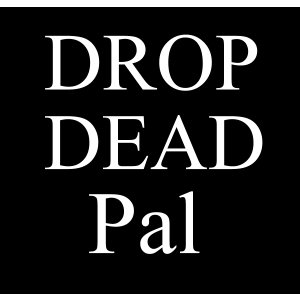 Over 100 people gathered in Pacific Beach on March 20, for the release of data from a five-year, $4 million study of the state’s South Coast Marine Protection Areas. The study began in 2011 and studied 12 areas of our shoreline’s ecosystem. Creation of these areas closed off recreational fishing in much of the oceanfront in the San Diego area. Erin Meyer, senior scientist from the Ocean Science Trust, the nonprofit agency assigned to coordinate the data, advised to group, “The purpose of the meeting was not to defeat the MPAs or debate its merits.” However, several angler groups and charter boat operators had questions. “What exactly are you monitoring?” asked Doug, a crewmember aboard the Black Jack charter boat out of Dana Landing in Mission Bay. The study, from data gathered by Sea Grant California, focused on different phases in 12 areas, including ecosystem, tides, kelp forest, spiny lobster, and sea birds. There was good news. Shad Catarius, a commercial lobster fisherman, was on the study group for the spiny lobster issue. read the story click here 20:08
Over 100 people gathered in Pacific Beach on March 20, for the release of data from a five-year, $4 million study of the state’s South Coast Marine Protection Areas. The study began in 2011 and studied 12 areas of our shoreline’s ecosystem. Creation of these areas closed off recreational fishing in much of the oceanfront in the San Diego area. Erin Meyer, senior scientist from the Ocean Science Trust, the nonprofit agency assigned to coordinate the data, advised to group, “The purpose of the meeting was not to defeat the MPAs or debate its merits.” However, several angler groups and charter boat operators had questions. “What exactly are you monitoring?” asked Doug, a crewmember aboard the Black Jack charter boat out of Dana Landing in Mission Bay. The study, from data gathered by Sea Grant California, focused on different phases in 12 areas, including ecosystem, tides, kelp forest, spiny lobster, and sea birds. There was good news. Shad Catarius, a commercial lobster fisherman, was on the study group for the spiny lobster issue. read the story click here 20:08
Lobsters seized from offshore trawler donated to homeless veterans by Massachusetts Environmental Police
 Massachusetts Environmental Police donated lobsters seized from an offshore trawler in New Bedford to veterans after officials determined the lobsters could not be returned to the water. Environmental police officers conducted an inspection of an offshore trawler in New Bedford on Sunday and found the vessel caught more than 500 lobsters. Commercial trawlers are limited to 100 lobsters daily and cannot exceed more than 500 lobsters if caught outside of state waters, authorities said. “After counting the lobsters being offered for sale, it was determined the vessel was over the 500 count limit,” according to the Environmental Police. “Officers seized the lobsters and cited the vessel for being over the limit.” read the rest here 13:21
Massachusetts Environmental Police donated lobsters seized from an offshore trawler in New Bedford to veterans after officials determined the lobsters could not be returned to the water. Environmental police officers conducted an inspection of an offshore trawler in New Bedford on Sunday and found the vessel caught more than 500 lobsters. Commercial trawlers are limited to 100 lobsters daily and cannot exceed more than 500 lobsters if caught outside of state waters, authorities said. “After counting the lobsters being offered for sale, it was determined the vessel was over the 500 count limit,” according to the Environmental Police. “Officers seized the lobsters and cited the vessel for being over the limit.” read the rest here 13:21
How a Floating Bale of Cocaine Led to the Florida Keys’ Worst Murder in Decades
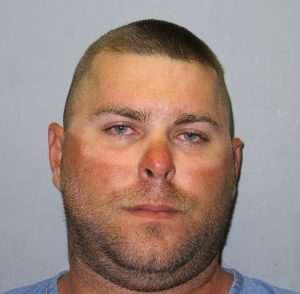 The Florida Keys are many things: a sun-bleached playground for the ultrarich, a blue-collar home to thousands of fishermen and hospitality workers, a rural chain of coral rock emerging just above the rising seas. There are ugly bar fights and plenty of drugs. But there’s hardly any gun violence. A young couple brutally executed a few feet from their young children? Never. Rosado and Ortiz’s mysterious killing on October 15, 2015, sent locals from Key Largo to Islamorada into a panic and left sheriff’s deputies scrambling. Detectives would follow a trail of violence and blackmail for months before divining its source: Jeremy Macauley, a fisherman with a troubled past who’d found a bale of pure cocaine floating in the turquoise sea. Months later, a prosecutor’s suicide and a surprise jailhouse interview would further muddy the tale. continue reading the story here 11:57
The Florida Keys are many things: a sun-bleached playground for the ultrarich, a blue-collar home to thousands of fishermen and hospitality workers, a rural chain of coral rock emerging just above the rising seas. There are ugly bar fights and plenty of drugs. But there’s hardly any gun violence. A young couple brutally executed a few feet from their young children? Never. Rosado and Ortiz’s mysterious killing on October 15, 2015, sent locals from Key Largo to Islamorada into a panic and left sheriff’s deputies scrambling. Detectives would follow a trail of violence and blackmail for months before divining its source: Jeremy Macauley, a fisherman with a troubled past who’d found a bale of pure cocaine floating in the turquoise sea. Months later, a prosecutor’s suicide and a surprise jailhouse interview would further muddy the tale. continue reading the story here 11:57
Prosecutor reviewing sex-abuse allegations against ‘Deadliest Catch’ star Sig Hansen
 Snohomish County prosecutors are re-examining allegations that celebrity crab-boat captain Sig Hansen sexually abused his toddler daughter nearly three decades ago, after the now 28-year-old woman recently went public with the claims against her estranged father. Deputy prosecutor Matthew Baldock last week informed an attorney for Melissa Eckstrom, Hansen’s estranged daughter, that Snohomish County Prosecutor Mark Roe recently asked him to review the 1990 case file “to see if criminal charges are viable.” The prosecutor’s office declined to file charges against Hansen in the early 1990s after at least three reviews of the case. Under Washington law, sex crimes committed against children generally can be prosecuted up to the victim’s 30th birthday. Eckstrom turns 29 next month. continue reading the story here, and review Facts About Sig Hansen website here 10:53
Snohomish County prosecutors are re-examining allegations that celebrity crab-boat captain Sig Hansen sexually abused his toddler daughter nearly three decades ago, after the now 28-year-old woman recently went public with the claims against her estranged father. Deputy prosecutor Matthew Baldock last week informed an attorney for Melissa Eckstrom, Hansen’s estranged daughter, that Snohomish County Prosecutor Mark Roe recently asked him to review the 1990 case file “to see if criminal charges are viable.” The prosecutor’s office declined to file charges against Hansen in the early 1990s after at least three reviews of the case. Under Washington law, sex crimes committed against children generally can be prosecuted up to the victim’s 30th birthday. Eckstrom turns 29 next month. continue reading the story here, and review Facts About Sig Hansen website here 10:53
20-year shellfish harvester says he can’t wait long for return of cod
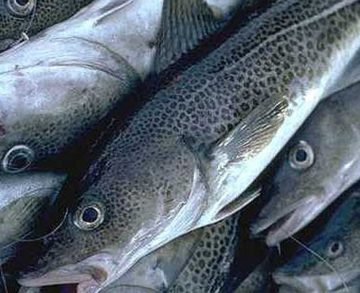 The return of an expanded commercial cod fishery in Newfoundland and Labrador can’t come soon enough for Basil Goodyear, a fisherman in Lumsden who’s been relying on shellfish for about 20 years. Goodyear first started fishing crab and shrimp with three of his brothers in 1997. But as the stocks of shrimp and crab continue to fall, Goodyear is looking for somewhere to turn. He told CBC Radio’s The Broadcast on Monday that he might be able to tough it out if a full commercial cod fishery returns in five years’ time, but he says 10 years is too long to wait. Goodyear predicts there will not be many people left in the fishing industry in a decade unless there are quota increases in some species. He is not sure how much longer his crew can last with crab and shrimp alone. continue reading the story here 09:02
The return of an expanded commercial cod fishery in Newfoundland and Labrador can’t come soon enough for Basil Goodyear, a fisherman in Lumsden who’s been relying on shellfish for about 20 years. Goodyear first started fishing crab and shrimp with three of his brothers in 1997. But as the stocks of shrimp and crab continue to fall, Goodyear is looking for somewhere to turn. He told CBC Radio’s The Broadcast on Monday that he might be able to tough it out if a full commercial cod fishery returns in five years’ time, but he says 10 years is too long to wait. Goodyear predicts there will not be many people left in the fishing industry in a decade unless there are quota increases in some species. He is not sure how much longer his crew can last with crab and shrimp alone. continue reading the story here 09:02
Yacht Captain in fatal crash is guilty
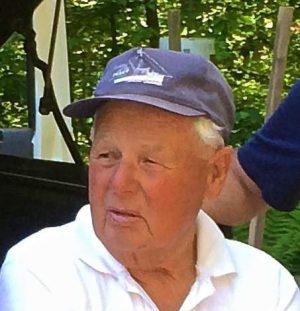 The New Jersey captain who was operating the 60-foot yacht that collided with a Stonington fisherman’s boat off Watch Hill Reef in September 2015 was found guilty on Monday of three violations of Coast Guard navigation rules. Licensed Captain Cooper Bacon, 76, was piloting the larger vessel between boat shows in Rhode Island and Connecticut when he collided with 81-year-old Walter Krupinski’s 23-foot Steiger center console. The Stonington resident, who was a commercial rod and reel fisherman, was fishing off Watch Hill Reef and had decided to head home for the day when the collision occurred, resulting in Krupinski’s death. continue reading the story here 08:34
The New Jersey captain who was operating the 60-foot yacht that collided with a Stonington fisherman’s boat off Watch Hill Reef in September 2015 was found guilty on Monday of three violations of Coast Guard navigation rules. Licensed Captain Cooper Bacon, 76, was piloting the larger vessel between boat shows in Rhode Island and Connecticut when he collided with 81-year-old Walter Krupinski’s 23-foot Steiger center console. The Stonington resident, who was a commercial rod and reel fisherman, was fishing off Watch Hill Reef and had decided to head home for the day when the collision occurred, resulting in Krupinski’s death. continue reading the story here 08:34
Mexican fishermen burn boat, demand environmentalists out
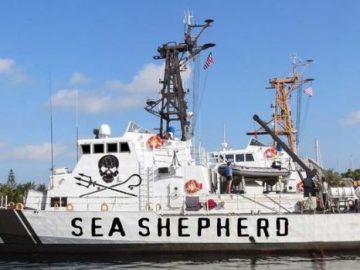 Dozens of fishermen have burned a boat as part of a threat to force out a ship operated by the Sea Shepherd Conservation Society in Mexico’s Gulf of California. Sea Shepherd has been removing illegal and abandoned nets that endanger the vaquita, the world’s smallest porpoise. Fishermen in the town of San Felipe painted the name of the Sea Shepherd on an empty, open fishing boat they burned Sunday. They threatened to remove the conservationists’ ship themselves if the government doesn’t. “Just as they are judging us fishermen, we will judge all the environmentalists,” said Sunshine Rodriguez, a leader of the local fishing cooperative in San Felipe, Baja California. “We aren’t going to just sit around.” A speaker at Sunday’s protest — which drew hundreds of onlookers and supporters at San Felipe’s main waterfront boulevard— said over a loudspeaker, “I’m giving them (the government) five days to get this boat out of our territorial waters, or we will do it ourselves. Read the story here 17:03
Dozens of fishermen have burned a boat as part of a threat to force out a ship operated by the Sea Shepherd Conservation Society in Mexico’s Gulf of California. Sea Shepherd has been removing illegal and abandoned nets that endanger the vaquita, the world’s smallest porpoise. Fishermen in the town of San Felipe painted the name of the Sea Shepherd on an empty, open fishing boat they burned Sunday. They threatened to remove the conservationists’ ship themselves if the government doesn’t. “Just as they are judging us fishermen, we will judge all the environmentalists,” said Sunshine Rodriguez, a leader of the local fishing cooperative in San Felipe, Baja California. “We aren’t going to just sit around.” A speaker at Sunday’s protest — which drew hundreds of onlookers and supporters at San Felipe’s main waterfront boulevard— said over a loudspeaker, “I’m giving them (the government) five days to get this boat out of our territorial waters, or we will do it ourselves. Read the story here 17:03
Editorial: Fishermen should look for smart ways to survive
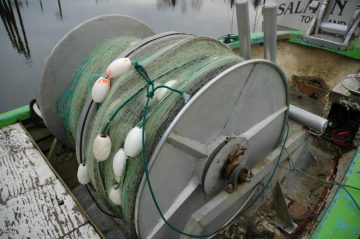 As spring Chinook salmon congregate in the ocean around the mouth of the Columbia River in anticipation of their ancient migration to upriver spawning grounds, this spring also sees a swirling conglomeration of politics in Oregon and Washington state over how to allocate salmon among different interests. In some ways nothing new, in other respects the fight over salmon is rising to a higher pitch. Increasingly involving elected leaders, the outcome is becoming even less predictable. Also unclear is where a majority of Oregon and Washington state voters stand on the issue. The key point of recent news in the matter is the Oregon Fish and Wildlife Commission’s unanimous vote to curtail gillnet fish harvests, altering an earlier decision that was more favorable to commercial fishermen. Bullied into the decision by Gov. Kate Brown, the commission backed away from its earlier acknowledgment that the states have so far failed to keep a promise made by the Oregon Legislature to ensure the continuing economic viability of the commercial fleet. Alternative fishing methods have proven ineffective, alternative fishing grounds are in short supply, and money has been slow to arrive to aid transition away from the decades long gillnetting tradition. continue reading the op-ed here 16:20
As spring Chinook salmon congregate in the ocean around the mouth of the Columbia River in anticipation of their ancient migration to upriver spawning grounds, this spring also sees a swirling conglomeration of politics in Oregon and Washington state over how to allocate salmon among different interests. In some ways nothing new, in other respects the fight over salmon is rising to a higher pitch. Increasingly involving elected leaders, the outcome is becoming even less predictable. Also unclear is where a majority of Oregon and Washington state voters stand on the issue. The key point of recent news in the matter is the Oregon Fish and Wildlife Commission’s unanimous vote to curtail gillnet fish harvests, altering an earlier decision that was more favorable to commercial fishermen. Bullied into the decision by Gov. Kate Brown, the commission backed away from its earlier acknowledgment that the states have so far failed to keep a promise made by the Oregon Legislature to ensure the continuing economic viability of the commercial fleet. Alternative fishing methods have proven ineffective, alternative fishing grounds are in short supply, and money has been slow to arrive to aid transition away from the decades long gillnetting tradition. continue reading the op-ed here 16:20

A deadly epidemic: Addiction to opioids has put an entire generation at risk
Dr. Mary Dowd slid into a chair inside the Portland offices of Catholic Charities and surveyed the list of patients, all battling opioid addiction.,, Many people struggling with addiction find treatment and regain their lives. She sees it every day. Those are the lucky ones. But it’s the people she never gets to see who frustrate her. The ones who don’t make it. The ones who are dying in unprecedented numbers. They are dying in the potato fields of Aroostook County and the lobster-fishing harbors Down East. They are dying in the western Maine foothills where paper mill closures have sown economic anxiety. They are dying in cities like Portland and Lewiston and in the suburbs, where opioids are in plentiful supply. They are dying in New Bedford, Portsmouth, Anytown USA. I know this is not a fishing article, but it is a problem within every fishing community, not only ours. It’s a human tragedy. Read this story here 15:03
FISH-NL: Reopening the seal hunt – “If licensed sealers want to hunt seal let them hunt seal.”
 The Federation of Independent Sea Harvesters of Newfoundland and Labrador (FISH-NL) is disappointed with a decision by the federal Department of Fisheries and Oceans to reopen the seal hunt to a limited harvest between March 28-April 7. Early last week FISH-NL called on DFO to reopen the harp and hood seal hunt to all harvesters and all fleets in Newfoundland and Labrador by March 25th. The federal government closed the hunt on March 15th to allow time for seal whelping and nursing. On Friday, FISH-NL was informed by federal sources that the seal hunt would reopen by March 28th (which it will be — 6 a.m. Tuesday morning), but not for all fleets and harvesters. Instead, licences will only be issued to a small number of vessels hunting adult seals for Phucolax International, a Fleur de Lys-based sealing operation that’s in the market right now for up to 4,000 animals. “It’s acknowledged by all quarters that an unchecked seal population is having an impact on delicate stocks such as shrimp, crab and cod, so why is DFO putting any restrictions at all on reopening the hunt?” asks Ryan Cleary, President of FISH-NL. “If licensed sealers want to hunt seal let them hunt seal.” Ryan Cleary 14:33
The Federation of Independent Sea Harvesters of Newfoundland and Labrador (FISH-NL) is disappointed with a decision by the federal Department of Fisheries and Oceans to reopen the seal hunt to a limited harvest between March 28-April 7. Early last week FISH-NL called on DFO to reopen the harp and hood seal hunt to all harvesters and all fleets in Newfoundland and Labrador by March 25th. The federal government closed the hunt on March 15th to allow time for seal whelping and nursing. On Friday, FISH-NL was informed by federal sources that the seal hunt would reopen by March 28th (which it will be — 6 a.m. Tuesday morning), but not for all fleets and harvesters. Instead, licences will only be issued to a small number of vessels hunting adult seals for Phucolax International, a Fleur de Lys-based sealing operation that’s in the market right now for up to 4,000 animals. “It’s acknowledged by all quarters that an unchecked seal population is having an impact on delicate stocks such as shrimp, crab and cod, so why is DFO putting any restrictions at all on reopening the hunt?” asks Ryan Cleary, President of FISH-NL. “If licensed sealers want to hunt seal let them hunt seal.” Ryan Cleary 14:33
Report: Newfoundland cod stocks on rebound, but still at critically low levels
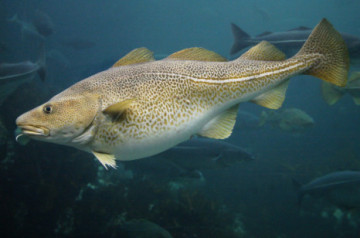 A new federal report says northern cod stocks off eastern Newfoundland continue to grow 25 years after a sweeping moratorium, but warns they remain in the “critical zone.” The Fisheries and Oceans Canada update concludes fishing should be kept to the lowest possible levels as a precaution. It finds that while total biomass was up seven per cent from 2015 to 2016, stocks are still at critically low levels. The report says there was a spawning biomass of about 300,000 tonnes in 2015. Fisheries biologist Karen Dwyer says a spawning biomass of about 900,000 tonnes would support a more extensive commercial fishery. Link 10:55
A new federal report says northern cod stocks off eastern Newfoundland continue to grow 25 years after a sweeping moratorium, but warns they remain in the “critical zone.” The Fisheries and Oceans Canada update concludes fishing should be kept to the lowest possible levels as a precaution. It finds that while total biomass was up seven per cent from 2015 to 2016, stocks are still at critically low levels. The report says there was a spawning biomass of about 300,000 tonnes in 2015. Fisheries biologist Karen Dwyer says a spawning biomass of about 900,000 tonnes would support a more extensive commercial fishery. Link 10:55
Western Pacific Regional Fishery Management Council seeks to Reopen Papahanaumokuakea to Fishing
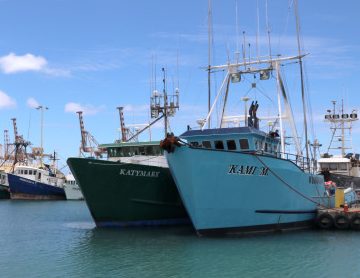 The Western Pacific Regional Fishery Management Council concluded its three-day meeting in Honolulu with a suite of recommendations, many of which are focused on keeping U.S. fishing grounds open to sustainably managed U.S. fisheries. The council includes the local fishery department directors from Hawaii, American Samoa, Guam and the CNMI, fishing experts appointed by the Governors and federal agencies involved in fishing-related activities. Marine national monuments, national marine sanctuaries, other marine protected area designations and Department of Defense training are among the uses that are increasingly closing off fishing grounds in U.S. waters. Council Chair Edwin A. Ebisui Jr. clarified that council communications to the administration about impacts of marine national monuments on fisheries are not lobbying. Some environmental activists recently made misleading statements about this in regards to a letter to President Trump prepared on March 1, 2017, by the Council Coordination Committee or CCC. The CCC includes the chairs of the nation’s eight regional fishery management councils. The letter details the impact of designations of Marine National Monuments under the Antiquities Act in the Atlantic and Pacific Oceans and was submitted to the president after conferring with the NOAA Office of General Counsel. To address the impacts of ever increasing fishing grounds being closed, the council agreed to the following: continue reading the story here 06:09
The Western Pacific Regional Fishery Management Council concluded its three-day meeting in Honolulu with a suite of recommendations, many of which are focused on keeping U.S. fishing grounds open to sustainably managed U.S. fisheries. The council includes the local fishery department directors from Hawaii, American Samoa, Guam and the CNMI, fishing experts appointed by the Governors and federal agencies involved in fishing-related activities. Marine national monuments, national marine sanctuaries, other marine protected area designations and Department of Defense training are among the uses that are increasingly closing off fishing grounds in U.S. waters. Council Chair Edwin A. Ebisui Jr. clarified that council communications to the administration about impacts of marine national monuments on fisheries are not lobbying. Some environmental activists recently made misleading statements about this in regards to a letter to President Trump prepared on March 1, 2017, by the Council Coordination Committee or CCC. The CCC includes the chairs of the nation’s eight regional fishery management councils. The letter details the impact of designations of Marine National Monuments under the Antiquities Act in the Atlantic and Pacific Oceans and was submitted to the president after conferring with the NOAA Office of General Counsel. To address the impacts of ever increasing fishing grounds being closed, the council agreed to the following: continue reading the story here 06:09
River of needles: Group seeks support as number of syringes in the Merrimack River soars
 Just a few years ago the junk that Clean River Project volunteers pulled out of the Merrimack River between Lowell and Haverhill consisted mostly of tires, shopping carts, toys, appliances, furniture and even entire vehicles. Every so often, they would come upon a syringe or two, which they would place into sharps containers for proper disposal. Rocky Morrison, president of the nonprofit Clean River Project, said he didn’t give it much thought until last year, when his volunteers saw a huge increase in the number of syringes they were finding. They collected more than 1,000 last year, and he said there are more out there. According to American Rivers, the Merrimack River is one of the three most important large rivers on the East Coast in its conservation value to migratory river herring and one of the six most important for 12 migratory fish species. Read the story here 19:25 (it’s disgusting.) Meanwhile A federal judge has ordered the National Marine Fisheries Service to revisit a decision not to list the blueback herring as a threatened species. Read the story here 19:42
Just a few years ago the junk that Clean River Project volunteers pulled out of the Merrimack River between Lowell and Haverhill consisted mostly of tires, shopping carts, toys, appliances, furniture and even entire vehicles. Every so often, they would come upon a syringe or two, which they would place into sharps containers for proper disposal. Rocky Morrison, president of the nonprofit Clean River Project, said he didn’t give it much thought until last year, when his volunteers saw a huge increase in the number of syringes they were finding. They collected more than 1,000 last year, and he said there are more out there. According to American Rivers, the Merrimack River is one of the three most important large rivers on the East Coast in its conservation value to migratory river herring and one of the six most important for 12 migratory fish species. Read the story here 19:25 (it’s disgusting.) Meanwhile A federal judge has ordered the National Marine Fisheries Service to revisit a decision not to list the blueback herring as a threatened species. Read the story here 19:42
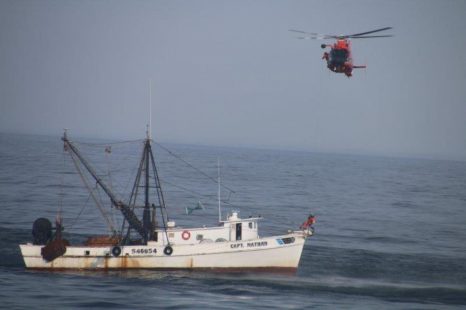
Coast Guard medevacs fisherman 50 miles E of Chincoteague, VA
The Coast Guard medevaced an injured man 50 miles east of Chincoteague, Virginia, Sunday. Watchstanders at 5th District command center in Portsmouth received an Electronic Position Indicating Radio Beacon, (EPIRB) alert from the 75-foot trawler Capt Nathan with three people aboard. Watchstanders diverted the U.S. Coast Guard Cutter Escanaba and an MH-65D Dolphin helicopter crew from Coast Guard Air Station Atlantic City to the scene. The crew of the Escanaba established communications with the crew and discovered the captain was suffering symptoms of a stroke. The helicopter crew arrived on scene and hoisted the man and transferred him to Cape May Airport, Cape May, New Jersey, where another helicopter crew from Air Station Atlantic City transferred the patient to AtlantiCare Regional Medical Center in Atlantic City, New Jersey. more images here 15:57
Processor Fined for dumping oily bilge water and raw sewage in Kodiak Waters
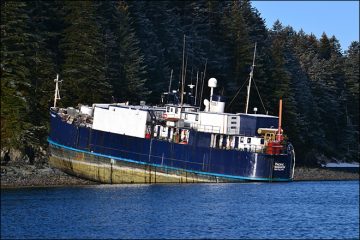 A Washington processing company that owns a Kodiak-based vessel was sentenced in federal court to pay $50,000 in fines after the vessel illegally discharged raw sewage into Chiniak Bay and St. Paul Harbor in Kodiak. In addition, the primary operator of the F/V Pacific Producer was sentenced to a $10,000 fine. Both the operator and the company will serve five years probation. According to a press release from the U.S. Attorney’s office in Anchorage, East West Seafoods LLC was sentenced for violating the Act to Prevent Pollution from Ships, the Clean Water Act, and the Refuse Act, by intentionally discharging oily bilge water and raw sewage. East West owns the F/V Pacific Producer. The primary owner of the processing company and operator of the vessel is 78-year-old Christos Tsabouris of Kodiak. Read the story here 14:40
A Washington processing company that owns a Kodiak-based vessel was sentenced in federal court to pay $50,000 in fines after the vessel illegally discharged raw sewage into Chiniak Bay and St. Paul Harbor in Kodiak. In addition, the primary operator of the F/V Pacific Producer was sentenced to a $10,000 fine. Both the operator and the company will serve five years probation. According to a press release from the U.S. Attorney’s office in Anchorage, East West Seafoods LLC was sentenced for violating the Act to Prevent Pollution from Ships, the Clean Water Act, and the Refuse Act, by intentionally discharging oily bilge water and raw sewage. East West owns the F/V Pacific Producer. The primary owner of the processing company and operator of the vessel is 78-year-old Christos Tsabouris of Kodiak. Read the story here 14:40
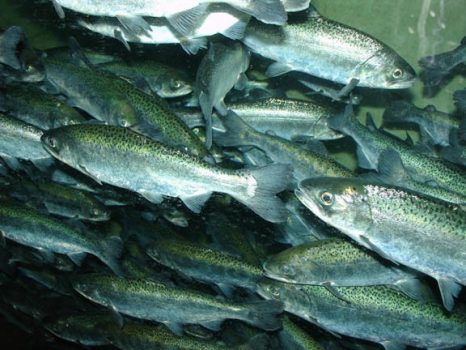
In ‘Crisis,’ Yuroks Suspend Commercial Salmon Season
For the second year in a row, the Yurok Tribe will not have a commercial fishery — a devastating blow to the tribe’s culture and economy. “We are in crisis mode,” said Yurok Tribal Chair Thomas O’Rourke in a press release that lamented poor conditions on the Klamath River that have led to historically low salmon returns. “The Klamath is our grocery store, our church and our main highway. It’s our lifeline. We will leave no stone unturned in search of additional short-term and long-term solutions to address the most terrible fisheries disaster in the Tribe’s history.” The release comes after the Pacific Fisheries Management Council released its predicted Chinook salmon returns for 2017 at 11,000 fish — the lowest on record — and the tribe’s fish harvest allocation at 650 fish, or one for every 10 tribal members. The predicted return comes after two years of disease outbreaks in juvenile fish due to low flows and elevated water temperatures in the Klamath River. continue reading the story here 13:44
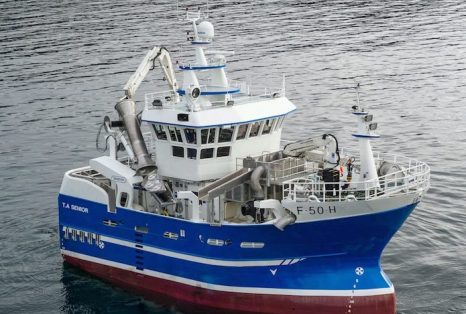
Small – but packs a punch!
It isn’t often that a 15 metre fishing boat hits the industry headlines but the launching in Norway last month of the TA Senior has certainly grabbed everyone’s attention. While dimensions of 15m in length with an 8m beam may not be every fisherman’s preference, in this particular case it works and combines to produce an extremely versatile and hardy vessel fit for operating in a diverse range of fisheries. While the biggest claim to fame in recent times from the Stadyard shipyard, located at Raudeberg near Måløy on Norway’s west coast, may be the production of the eye-catching 70m purse seiner/pelagic vessel Torbas two years ago (now the Faroese Høgaberg), it is the latest building of TA Senior for Akkarfjord fisherman Morten Ingebrigtsen in Finnmark that has again brought this yard into the limelight. continue reading the article here 11:43
Alaska fishermen lobby Navy to delay training exercises scheduled for May
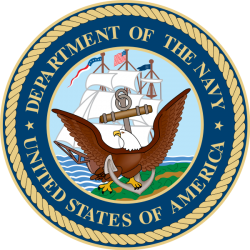 The required permits are not yet in hand but the U.S. Navy is moving ahead on plans to conduct war training exercises in the Gulf of Alaska for two weeks in early May. Meanwhile, nine coastal communities have signed resolutions asking the Navy to instead conduct its training between September and mid-March, less-sensitive times for migrating salmon, birds and marine mammals. “It’s not that we don’t want the Navy to do their training — it’s the time and locations,” said Emily Stolarcyk, program director for the Eyak Preservation Council of Cordova. “The community resolutions say that we are the people who depend on commercial, subsistence and recreational fishing,” she added. “The Navy exercises are planned during the most important breeding and migratory periods for salmon, birds, whales and marine mammals. About 90 percent of the training area is designated as essential fish habitat for all five species of Pacific salmon. May is the worst time to be doing this.” continue reading the article here 11:07
The required permits are not yet in hand but the U.S. Navy is moving ahead on plans to conduct war training exercises in the Gulf of Alaska for two weeks in early May. Meanwhile, nine coastal communities have signed resolutions asking the Navy to instead conduct its training between September and mid-March, less-sensitive times for migrating salmon, birds and marine mammals. “It’s not that we don’t want the Navy to do their training — it’s the time and locations,” said Emily Stolarcyk, program director for the Eyak Preservation Council of Cordova. “The community resolutions say that we are the people who depend on commercial, subsistence and recreational fishing,” she added. “The Navy exercises are planned during the most important breeding and migratory periods for salmon, birds, whales and marine mammals. About 90 percent of the training area is designated as essential fish habitat for all five species of Pacific salmon. May is the worst time to be doing this.” continue reading the article here 11:07
CETA: Liberals’ passivity a detriment to our fishery
 The Comprehensive Economic Trade Agreement (CETA) was approved with Premier Dwight Ball and Prime Minister Justin Trudeau in office. So, what was negotiated to transition our fishing industry to a more competitive, technologically advanced, scientific and market-driven industry? Apparently, according to Premier Ball, nothing! An area of provincial jurisdiction was relinquished to Ottawa to use in their negotiations with the EU, with only silence from the Ball Liberals for the past 15 months, despite a signed letter from Trudeau promising that this province would be given a $400-million fisheries investment fund as a condition of giving up minimum processing requirements (MPRs). There was no mention of an “Atlantic” fisheries fund in his letter.In 2014, Trudeau wrote: “your government’s support of the CETA was earned, in part, by a promise from the Government of Canada to help the industry adjust to the new reality. That promise should be honoured.” He referred specifically to the $400-million fund for Newfoundland and Labrador. Premier Ball was not able to deliver on that written commitment. continue reading the op-ed here 10:18
The Comprehensive Economic Trade Agreement (CETA) was approved with Premier Dwight Ball and Prime Minister Justin Trudeau in office. So, what was negotiated to transition our fishing industry to a more competitive, technologically advanced, scientific and market-driven industry? Apparently, according to Premier Ball, nothing! An area of provincial jurisdiction was relinquished to Ottawa to use in their negotiations with the EU, with only silence from the Ball Liberals for the past 15 months, despite a signed letter from Trudeau promising that this province would be given a $400-million fisheries investment fund as a condition of giving up minimum processing requirements (MPRs). There was no mention of an “Atlantic” fisheries fund in his letter.In 2014, Trudeau wrote: “your government’s support of the CETA was earned, in part, by a promise from the Government of Canada to help the industry adjust to the new reality. That promise should be honoured.” He referred specifically to the $400-million fund for Newfoundland and Labrador. Premier Ball was not able to deliver on that written commitment. continue reading the op-ed here 10:18
Measuring flounder a complex undertaking with a big impact
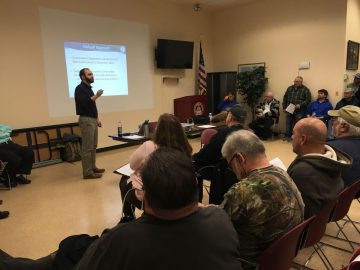 It’s likely few people have written more about summer flounder than Mark Terceiro. Terceiro has published a 44-page journal article about the science, politics and litigation surrounding the species from 1975 to 2000. A 32-page follow-up covered the period from 2001 to 2010, and another article regarding developments in recent years is in the works. But it’s Terceiro’s summer flounder stock assessment update, released by the National Oceanic and Atmospheric Administration in December, that has him in the crosshairs of New Jersey politicians and recreational fishing leaders. Terceiro, a research fishery biologist at NOAA’s Northeast Fisheries Science Center, said a lot of information goes into a stock assessment. “The catch is, from both commercial and recreational, very important — that it be accurate,” Terceiro added. “We try — the government, the states — (to) go to great lengths to make sure the catch reports are as accurate as they can get.” continue reading the article here 09:20
It’s likely few people have written more about summer flounder than Mark Terceiro. Terceiro has published a 44-page journal article about the science, politics and litigation surrounding the species from 1975 to 2000. A 32-page follow-up covered the period from 2001 to 2010, and another article regarding developments in recent years is in the works. But it’s Terceiro’s summer flounder stock assessment update, released by the National Oceanic and Atmospheric Administration in December, that has him in the crosshairs of New Jersey politicians and recreational fishing leaders. Terceiro, a research fishery biologist at NOAA’s Northeast Fisheries Science Center, said a lot of information goes into a stock assessment. “The catch is, from both commercial and recreational, very important — that it be accurate,” Terceiro added. “We try — the government, the states — (to) go to great lengths to make sure the catch reports are as accurate as they can get.” continue reading the article here 09:20

Trump supporters, protesters face off in noisy rival rallies at R.I. State House
Dueling rallies brought at least a thousand people to the Rhode Island State House grounds on Saturday to hail — or denounce — the presidency of Donald Trump, with Trump supporters chanting, “Build the wall, build the wall,” ,,,The pro-Trump rally in Providence was timed to coincide with similar rallies across the country led by Trump backers who felt compelled to publicly show that “real Americans” support the new president, despite the many controversies swirling around him. The Rhode Island event drew commercial fishermen from surrounding states — such as Gary Yearman of New London, Connecticut, and Dan Malone, of Stonington, Connecticut — who are pinning their hopes on Trump to ease regulations in their industry. “We’re here to try to gain some momentum, to possibility get a meeting with Mr. Trump or somebody that can take notice of the commercial fishing industry before they go out of business,” said Yearman, who estimated that 30 or 40 people, in his industry, from outside Rhode Island came to the rally. Read the story here 23:34
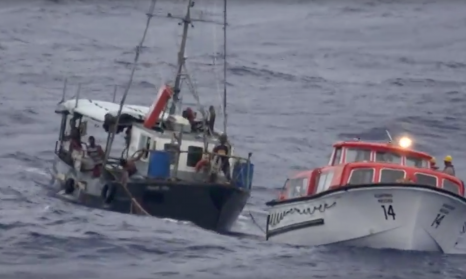
Where Boats Go To Die
He wakes in the middle of the night, unable to sleep, his mind going back to the day he lost everything. He grabs his daughter’s tablet and watches the video for the hundredth time. Shot from the deck of the German cruise liner Albatros, it shows his stricken trawler, the Losemani Fo’ou, being rescued by one of the ship’s life boats.A Tongan crewman ends up in the sea; another’s head is split open. Vailele Taukitoku had bought the trawler for $83,000 from New Zealand four months earlier – he never saw it again. He and five crew had been fishing for snapper several hundred kilometres south of Tonga when they discovered the alternator belt was loose and both banks of batteries were dead. continue reading the story here. Big Read! 21:42







